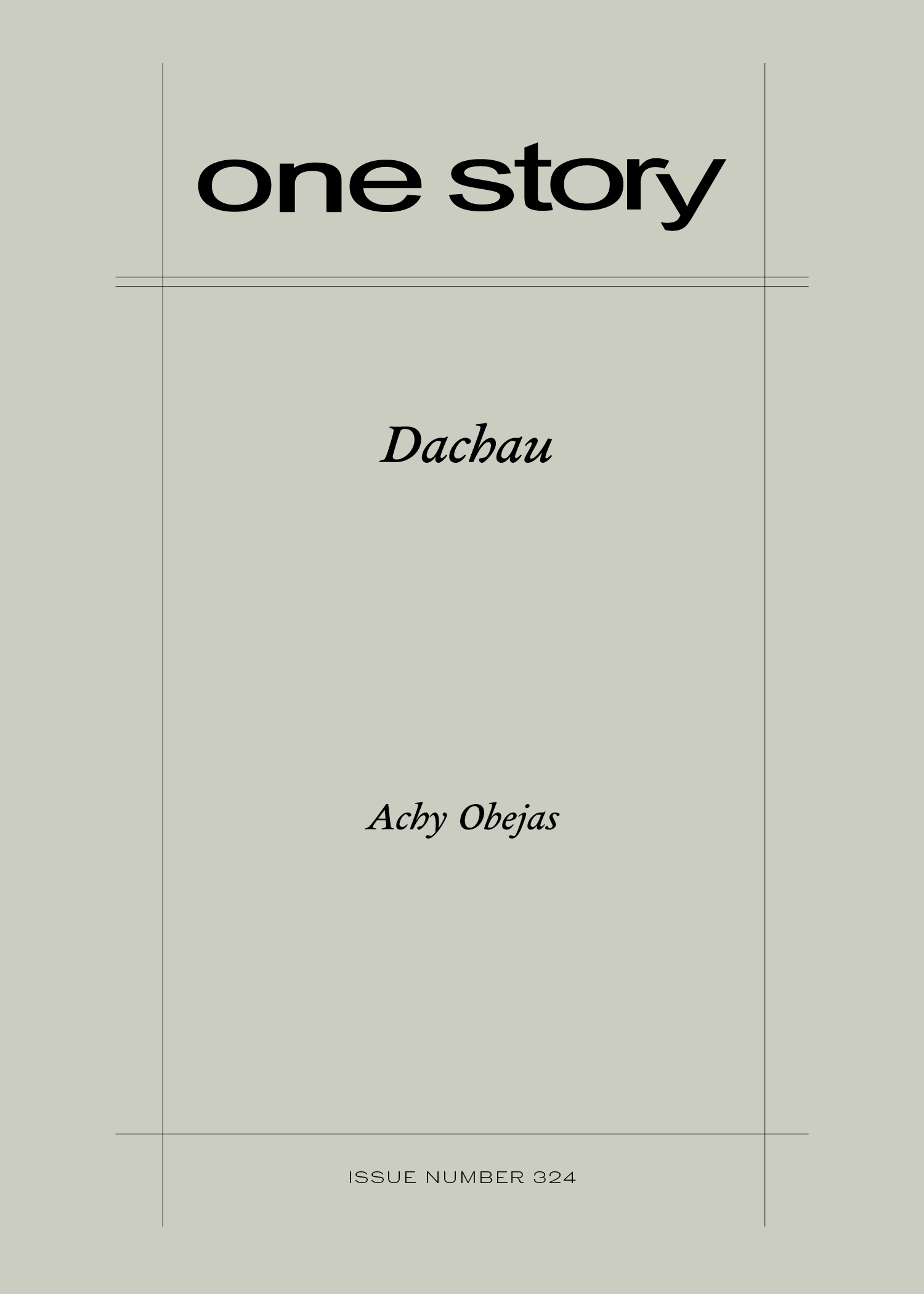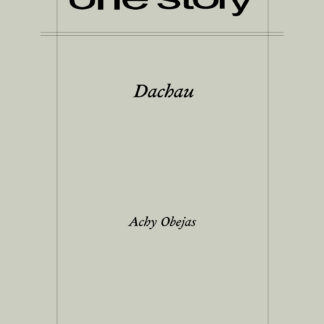
Dachau
$2.50
Excerpt
At one time, long ago, the town was known as an art colony. Gertrud Staats painted its vivid green hills. Walther Klemm, the bronze medal winner at the 1928 Olympic art competition, focused on the changing light of the Dachau moss, though that may have been best captured by Franz Marc in 1902’s Moorhütten im Dachauer Moos, a blurry portrait of nature overtaking an abandoned building. The tree nearest the center of the canvas seems to rise from the roof where a chimney might usually be found.
It’s raining now. The water runs down the train window in slanted rows, breaking away in droplets as it nears the bottom edge. It’s nighttime, but there’s plenty of light, both in and out of the passenger car, where the lamps flicker as we pass. It makes it almost impossible to discern an identifying feature on the faces of the only other two people in the passenger car, across from us—across from me and my best friend, Safia, known as La Guerrillera in contemporary art circles. She’s golden like maple syrup and wears a scarf around her head that makes me wonder if people think she’s Muslim.
Achy Obejas
Achy Obejas is the author of The Boy Kingdom/El reino de los varones, a forthcoming bilingual poetry book about motherhood, raising boys, love, and divorce. She also authored Boomerang/Bumerán, a bilingual collection of poetry written in a mostly gender-free English and Spanish that addresses immigration, displacement, love, and activism. She also authored The Tower of the Antilles, which was a PEN/Faulkner finalist, among other honors. Her novels include Ruins and Days of Awe, which was a Los Angeles Times Best Book of the Year. As a translator, Havana-born Achy has worked with Wendy Guerra, Rita Indiana, Junot Díaz, and Megan Maxwell, among others. A recipient of a United States Artists Fellowship, an NEA Literature Fellowship, and a Cintas Fellowship, among other awards, she lives in the San Francisco Bay area.
Will Allison on “Dachau”
Why would anyone choose to live in the town of Dachau, with its horrific legacy of Nazi Germany’s longest-running concentration camp? This is one of many questions Achy Obejas raises in “Dachau,” a dark and disturbing story for our dark and disturbing time.
As her protagonist, an expat Cuban visual artist, contemplates the town’s inhabitants and their relationship to its history, she finds no easy answers. She also finds that fascism can thrive anywhere—even at a memorial site designed to warn against fascism. As Faulkner wrote in Requiem for a Nun, “The past is never dead. It’s not even past.”
I had the pleasure of publishing Achy Obejas’s work in 1998, when I was an editor at the now-defunct (though since rebooted) Story. All these years later, it’s a pleasure to share her distinctive, incisive fiction with the readers of One Story as well.
Q&A by Will Allison
- WA: This story takes place mostly in Dachau, Germany, where the narrator and her friend Safia visit the concentration camp, so I have to ask—have you ever been there yourself, and if not, what inspired you to write this story?
- AO: I have, in fact, been to Dachau, but more than twenty years ago. My girlfriend at the time was an artist invited to Documenta, the big art extravaganza in Kassel. We made a few trips to Germany in advance to prepare for the exhibition, and I started doing some exploring on my own. After visiting Bergen-Belsen, I was greatly moved and insisted she come with to Dachau. But that turned out to be a very different experience. While Bergen-Belsen was almost sacred, Dachau was very touristy. And there were Nazis among the tourists, writing in the visitors logs and very openly praising what had happened there. We were shocked.
- WA: What was the hardest part of writing “Dachau”?
- AO: I’ve been wanting to write about this for a while, but I really had to process all the emotions first. I think it’s easy to fall into cliché with a story like this, or to virtue signal or sensationalize. I was more interested in the deeper story than in what we actually experienced in Dachau (the story isn’t autobiographical), in exploring the purpose and actuality of places like Dachau.
- WA: And what was the most rewarding part?
- AO: Finding the voice for this. I knew it had to be someone in diaspora, displaced even if seemingly successful in their exile, someone who would never, ever quite fit in anywhere and understood the riptides of history because of their own experience.
- WA: One thing I love about this story is its handling of themes of emigration, how a person decides whether to stay in a place or leave it, especially a place many people presumably would want to leave (in this case, Cuba and Dachau). Could you say a few words about this?
- AO: The question of staying or leaving a place that’s under tyranny is ultimately so personal. In this story, the narrator leaves Cuba because she has opportunity and imagines a better life awaits elsewhere. But her friend Safia stays, even though she has plenty of opportunity, arguably more opportunity as a global artist. And yet it’s obvious they share certain views about their home country, especially when they meet the bar owner, whom they both instantly tag as suspicious. We don’t know exactly why Safia stays in Cuba, but it could be a myriad of reasons: family, health, perhaps career, perhaps a desire to not give up completely and offer resistance. When I was in Dachau, I know I wondered about every person I ran into who would have been alive during the Second World War. Most of them would have been kids then. I left Cuba as a six-year-old; it wasn’t my decision. So I get being a part of something that is overwhelming and over which you have no control. But then why stay? Why stay in such a sad, sad place?
- WA: In addition to being a fiction writer and poet, you’re also a translator of other writers’ work. Do you translate your own work as well? For instance, will you someday publish a Spanish version of “Dachau”?
- AO: I rarely translate my own work, mostly because it’s so time consuming. In the last few years, though, I’ve been translating my own poetry. Boomerang/Bumerán came out in 2021 with Beacon as a fully bilingual volume, and we made the decision not to indicate which was the original language and which the translation, because I write in either language and sometimes in both, so we decided to honor that process. In September, Beacon’s publishing my next collection, The Boy Kingdom/El reino de los varones, about queer motherhood and raising boys, and we’ll do the same thing. I love translation, but novels just take forever, for me, and the idea of doing the same thing twice is more than I can bear. But stories—maybe there will be a Spanish version of “Dachau”!
- WA: Following up on that last question: when you sit down to write, do you typically compose in English or in Spanish, and why? And is it the same for both poetry and fiction?
- AO: It really depends. Most of the time, and especially for fiction, I start in English. But there’s usually some mixing along the way, and then I edit to English. It’s different with poetry. There doesn’t seem to be a rhyme or reason to it. And, of course, all my journalism is in English, from start to finish, because I publish in English.
- WA: How long did it take you to complete “Dachau”?
- AO: Years.
- WA: What are you working on now?
- AO: I’m revising a novel and looking forward to promoting The Boy Kingdom/El reino de los varones in the fall. And I’m working on a translation for Rita Indiana’s fab new book, Asmodeo.
- WA: What is the best bit of writing advice you’ve ever received?
- AO: It was from the poet Ellen Bryant Voigt. I’d lost the hang of writing poetry for years. And I was struggling a little bit with the slower, more reflective approach needed for fiction as compared to journalism, which is how I was earning a living back then. After a long talk, she somehow figured out I’d stopped writing longhand, and she encouraged me to get back to it, no matter what. You know, I hadn’t even made a conscious decision to stop; it was just that I was mostly working at my desk at the Chicago Tribune, and there was no room to write by hand. But once we got that, and I rearranged my desk, it just flowed again. The other thing she did was suggest different formatting for fiction and journalism, to send different signals to the brain. It sounds so silly, but it was kind of miraculous. I’m eternally grateful to her.
